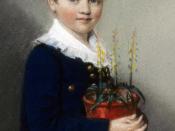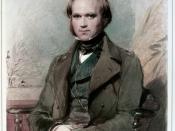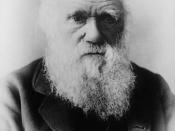Charles Darwin was born in Shrewsburry, England on February 12, 1809. He is the son of Robert Waring Darwin, a physician. Darwin showed little interest in his education at Shrewsburry School and in medical studies at Edinburgh University (1825-27). He decided to turn away from becoming a physician after witnessing several operations performed without anesthesia. At the same time he began to be interested in geology and in natural history. He was sent to study for Holy Orders for the Church of England at Christ Church College at Cambridge University in 1828.
Instead of becoming a minister he became more and more interested in natural history. After he got his B.A. degree in 1831 , a professor and friend, John Stevens Henslow recommended him for an unpaid position as a naturalist on a scientific expedition. Darwin went on a 5 year voyage on the H.M.S Beagle; a turning point in his life.
The ship set sail on December 27,1831 to study the Pacific Coast of South America and some Pacific Islands; and also set up navigation stations in the area. Darwin's duty was to study geology and biology of the areas. His research in geology was that sedimentary rocks crystallize when metamorphosed by overlying rocks. He also saw evidence of how volcanoes and earthquakes change the lay of the land, uplifting some areas. His theory of coral reefs were built up by skeletal remains of coral organisms that died as their home reefs around oceanic mountains sank below sea level. His common idea was all things in nature change in time . He published his observations like Coral Reefs in 1842, Volcanic Islands in 1844, Geological Observations On South America in 1846. The Galapagos Islands were probably the scene of his most important and best known research.
Darwin found...


